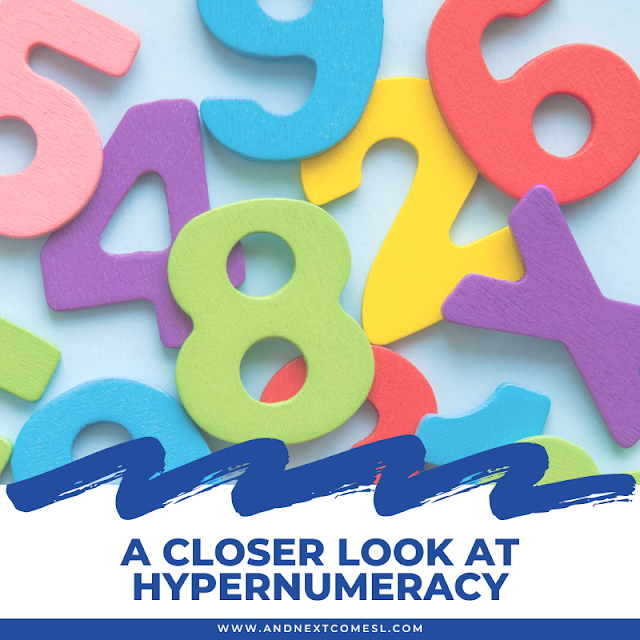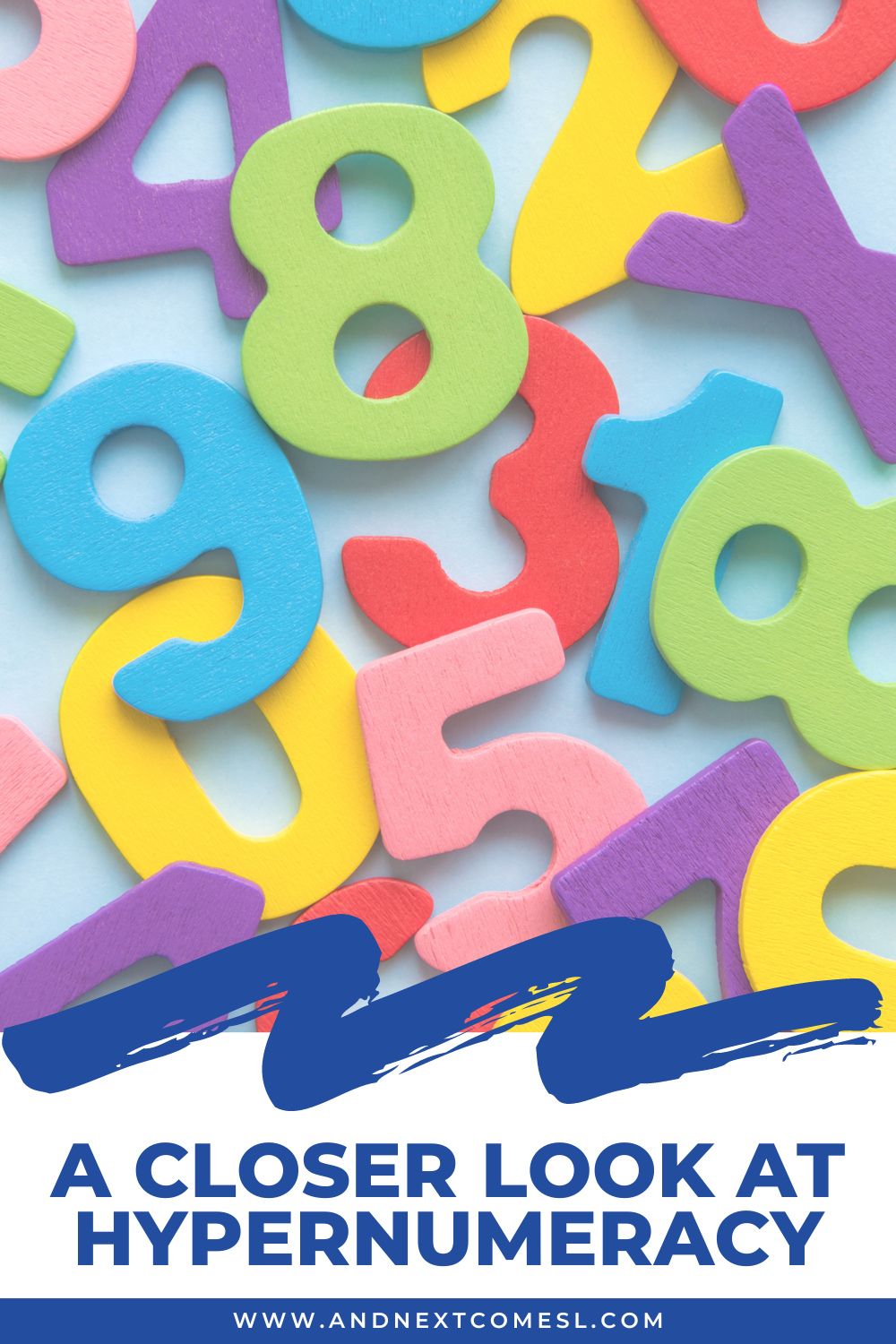The other morning I woke up with the bones of this blog post already written. The sentences just flowed freely in my mind and I was eager to sit down and write it all out. It all came together quite quickly.
My goal was to show how hypernumeracy is so much more than a precocious self-taught ability to do math and understand numbers (see the full definition of it here).
Essentially, I wanted to dive deeper than a list of hypernumeracy traits and capture the true essence of what hypernumeracy looks like, at least for my son.
It was my hope to try and paint a picture of just how interwoven numbers and math are with how my son learns and views the world. How it sparks joy for him. How that proclivity and passion is there no matter what age and stage he's at.
You'll see glimpses of what hypernumeracy is like in the toddler years, as he starts school, and how he grows. But this post doesn't go in any particular order, following him as he grows. No, instead it's bouncing around from different ages and stages because that's how the memories and ideas came to me as I wrote and I wanted to preserve that sense of randomness and unpredictability.
You may see your own story with your child reflected in these words.
So here's what hypernumeracy is...(at least, to us)
Hypernumeracy is...
Hypernumeracy is being more interested in the number of pages or the number of chapters than the book itself. "Look mom, this book has 87 chapters!"
It's making note of the speed limit from the back seat and informing the driver (aka me) that they're speeding.
It's noticing the depth of the swimming pool and comparing it to the depths of other pools you've been to. Of course, it's also about filing this information away for a later date (even years later!) so you can keep a running tally on which pool is the deepest.
Hypernumeracy is referring to movies by their runtime, not their title. People's houses - including your own! - by their house number (e.g., 845 rather than home). The car by the numbers in the license plate (e.g. 625 car). Homework in the amount of data in KB or MB. Energy levels in percentage of battery life. Everything is thought of in numbers.
It's pointing out that all four seasons have exactly six letters. Spring, check. Summer, check, Autumn, check. Winter, check. Mind blown, check.
It's drawing Roman numerals in chalk on the driveway at age five until the entire surface is covered. It's googling what three million is in Roman numerals because they want to know and you have zero clue.
It's art that stands out amongst those from their peers because it consists entirely of numbers. You'll always know which one is your child's because it's unique. And it's always 100% authentic to them, not some cookie cutter reproduction.
It's about taking a fresh notebook, writing a page number in the bottom corner of every single page, and then never having an interest in the notebook again.
It's about the need to write, draw, or make numbers everywhere they go and in everything they touch. Sometimes they might spell the number word out in other languages too.
It's carrying calculators everywhere you go. The diaper bag. The car seat. Your coat pocket. Your purse. The cart in the grocery store. By the way, it's the perfect birthday gift and stocking stuffer, I might add. And, honestly, calculators are still a favorite, even as a teenager.
It's about making number pancakes for breakfast, asking what number to make, and them telling you, "One sextillion. It has 21 zeros."
Hypernumeracy is questioning how your three year old is already skip counting, exploring fractions, and multiplying decimals all on their own. It's also wondering how on earth you're going to possibly keep up.
It's spending the first day of kindergarten writing large number words on the back of the schoolwork they were supposed to be doing. And it's grouping the counting bears into groups of 10 and quickly informing the teacher there are 100 bears - I informed her that she better not lose any now because he will know! It's about the teacher quickly realizing that you weren't making things up when you told them about your child's math abilities...
It is also constantly wondering how you're going to keep them challenged in school. It's teachers commenting on their exceptional math abilities. It's constantly exceeding expectations in math on every single report card.
It's teacher after teacher trying to supply them with more difficult work, only for them to complete it in a matter of minutes with ease. It's solving all the bonus questions and averaging above 100% because of said bonus questions. It's them pointing out that the teacher made a mistake in their calculation or used the wrong formula...
It's a fascination with nutrition labels, timers, clocks, scores. For others, it could be complex shapes, sports stats, or dates.
It's as if they're in sync with clocks. At least, that's how I can describe my son. While there might not be a clock in sight, my son can still tell you what time it is, almost exactly to the minute. He just knows what time it is.
Hypernumeracy is about finding numbers wherever you go and quantifying absolutely everything. It's living and breathing numbers and math. It's included in everything that they do.
It's spending their days as a toddler counting literally everything they can.
It's falling asleep clutching their favorite number.
It's a number themed book you've read so many times that the book is basically falling apart. But that's okay, you have it memorized anyway and so do they.
It's using math and counting as a way to regulate when overwhelmed.
It's playing with dice and number tiles or toys. Or, when there aren't any number toys available, it's turning other toys into numbers.
It's attempting to play with the thermostat in the waiting room that they can easily reach - because for some reason there's a couch right below it - instead of playing with the plethora of toys available to them.
It's doing sudoku puzzles and nonograms. It's doing connect the dot books for adults because the ones for kids don't use big enough numbers for their liking.
It's seeing fractions, not slices of a toy pizza during their autism assessment (that particular memory makes me chuckle all these years later).
The point is that hypernumeracy is an inherent part of who they are and how they see, experience, and interpret the world around them. It's an essential part of what lights them up and brings them joy.
It's a love story between a precocious child and their proclivity and passion for numbers and math.
A beautiful story that I am honored to watch unfold.



